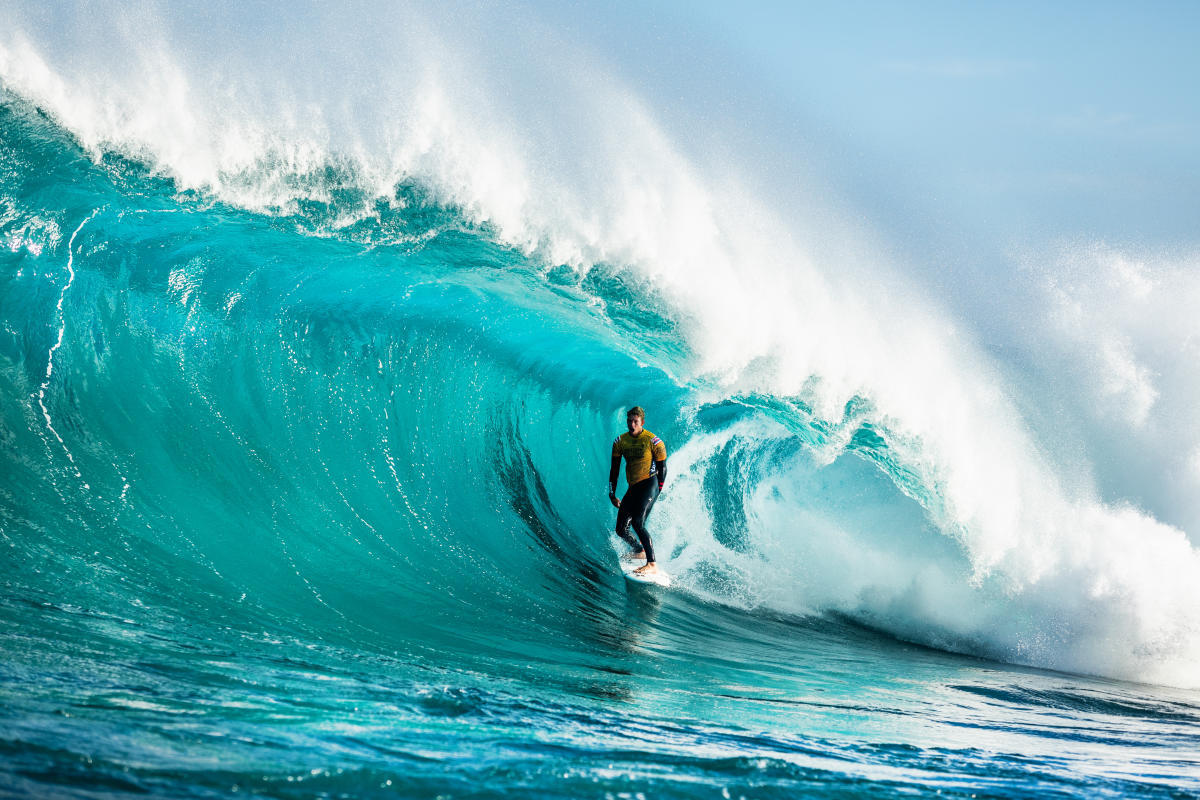“Pro Surfer Contracts Aren’t Worth The Paper They’re Printed On”
*quickly googles ‘force majeure’*
One minute you’re traipsing the globe with surfing’s most elite, the next you’re locked down in your home country wondering when (and if) another cheque is ever gonna land in your account.
You don’t need us to explain the Covid pandemic, its devastating death toll and how it’s ground the world’s economic gears to a halt. Never in any of our lifetimes have we seen something move so quickly and have such a devastating impact on the entire population of the world.
Facing that head-on the past few weeks are some of the surfing’s highest-paid surfers. As the industrialised world has put a freeze on nearly all nonessential labor (and thus spending), like almost all companies, surf brands have been scrambling to respond to stay alive—every single employee, contractor, lease or vendor of every brand is under scrutiny. And that still won’t guarantee a brand’s survival.
Most surfers over the last month have had to Google the term “force majeure”, what’s historically been considered a granular stipulation within most sponsorship contracts, or vis major, and commonly referred to as an Act of God Clause.
The Act of God clause leaves room for companies to cancel, re-negotiate, and most commonly void contracts if they are faced with “unforeseeable circumstances that prevent someone from fulfilling a contract.”
The circumstances we’re facing currently, and the subsequent slashes in surfer’s contracts, certainly fall under the “unforeseeable” category.
Jack Freestone ticks almost every marketing must-have checklist. He was reportedly about to sign a $AUD450k ($USD270k) deal with Billabong before the pandemic upended the world. This photograph of Jack was from Stab’s Luxury Black Tie shoot in Tahiti a few years back. Photo by Pat Stacey.
“We’ve never known what this “Act of God” looks like,” says an industry insider, who spoke on condition of anonymity. “You start throwing around words like pandemic and that contract is pretty much null and void. The pro surfer contracts aren’t worth the paper they’re printed on.”
“I’ve never seen more of a Wild West environment when it comes to what contracts mean,” Dave Tanner, CEO of boardriders, told Shop-Eat-Surf’ in an interview.
Significant moves have happened quickly to stem the bleed. According to sources, Hurley’s entire roster of surfers (or what’s left after the January housecleaning) will forgo their salaries for the next 90 days.
Most contracted surfers, from Billabong to Rip Curl to RVCA, have had the call. For now, they need to accept a 50 percent drop in salary – often in line with the executives in the business – until the dust settles and a more clear picture emerges.
Surfers like Filipe Toledo, who recently inked long term deals (five years in Filipe’s case), will find themselves back at the negotiating table (if they’re lucky, and if they aren’t silly enough to take the matter to court).
“Most surfers won’t choose to go legal,” an anonymous insider tells Stab. “What’s the point? Play a short game before a business goes broke, or play a long game and try to help the business get back on its feet?”
“Surfers are relatively calm about the situation. They are taking comfort in the fact of safety in numbers.”
One thing is for certain, the Golden Age of surf contracts is over. There are 11 surfers who joined the $1m-plus-a-year marquee contract club. Kelly Slater, Taj Burrow, Mick Fanning, Joel Parkinson, Dane Reynolds, Taj Burrow, Steph Gilmore, Julian Wilson, Kolohe Andino, Jordy Smith, Gabriel Medina and the man who signed surfing’s largest-ever contract, Mr. John Florence.

The most marketable and formerly highest paid surfer in the world, John Florence, was reportedly was also close to inking a deal with Rip Curl. Most assets that have been on the market too long tend to lose market value. That won’t happen with John Florence. Photo courtesy WSL.
Worth noting, reportedly John was at the 11th hour of closing a deal with Rip Curl when this pandemic rolled into town. It has since evaporated. Likewise, surfers like Creed McTaggart and Jack Freestone were on the precipice of closing big deals with Billabong but will now need to start over.”
“At best, most surfers are expecting a 50% cut in salary,” says our insider.
Today, with over a million Coronavirus cases reported worldwide, and the runaway Globalist Free Trade dream quickly becoming a paralyzing nightmare, there aren’t too many of us who aren’t personally impacted in this climate. Regardless of your politics or cynicism towards the Surf Industrial Complex’s rise to power, growing pains, corporate intimacy and counter-cultural neutering, it remains upstream from the pool we all swim in—each and every person reading this enjoys the entertainment, drama, inspiration, distraction, not to mention the quality, well-engineered hard goods because of these brands. Up until a few weeks ago you could still walk into brick and mortar surf shops in your community and find their wares. Today, that future is very much uncertain.













Comments
Comments are a Stab Premium feature. Gotta join to talk shop.
Already a member? Sign In
Want to join? Sign Up